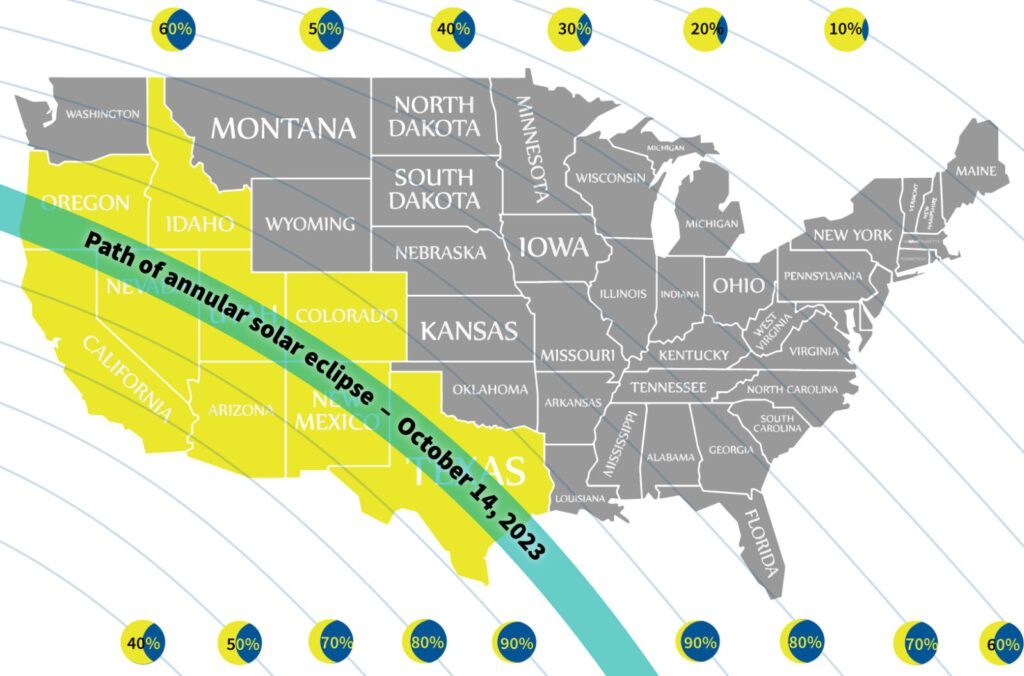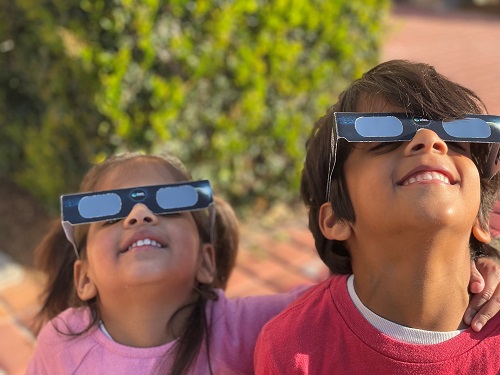October 14, 2023 Great American Eclipse (Annular Solar Eclipse)
The October 14, 2023 annular solar eclipse begins in Oregon at 11:15 pm EDT and ends in Texas at 12:03 p.m. EDT

An annular solar eclipse, sometimes described as a “ring of fire” is different from a total solar eclipse in that the view of the sun is never completely blocked by the moon. Therefore it is never safe to look directly at an annular eclipse without proper eye protection, such as solar eclipse glasses that meet the ISO 12312-2 standard.
The North American eclipse of October 14, 2023 is an upcoming celestial event eagerly anticipated by astronomy enthusiasts in North America. During this eclipse, the moon will pass in front of the sun, causing the sun to appear as a “ring of fire” in the sky. This unique phenomenon occurs when the moon is at its farthest point from the Earth, and it appears smaller than the sun, creating a ring-like effect.
The October 14, 2023 eclipse will be an annular solar eclipse, meaning the moon will not entirely cover the sun. The eclipse path will begin in Oregon and pass through parts of Idaho, Montana, and Wyoming, before crossing over Canada and ending in the Arctic Ocean. Observers in these areas can see the “ring of fire” effect created by the moon passing in front of the sun.
Find Out More About Protecting Your Eyes During the Eclipse
Tips for Using Solar Eclipse Glasses
The eclipse will begin around 10:06 AM Pacific Daylight Time in Oregon, and the point of the maximum eclipse will occur at 11:19 AM Mountain Daylight Time in Wyoming. The eclipse will last for approximately three and a half hours and end around 1:30 PM Eastern Daylight Time in the Atlantic Ocean.
How to Protect Your Eyes During the October 14 Annular Eclipse
The eclipse offers astronomy enthusiasts in North America a rare opportunity to witness a spectacular celestial event. While the eclipse path passes through some remote areas, those fortunate enough to see the event will be treated to a truly awe-inspiring display.
Those planning to observe the eclipse must take necessary precautions to ensure a safe and enjoyable experience. Looking directly at the sun during an eclipse can cause permanent eye damage, so it is crucial to use proper eye protection. In addition, special eclipse glasses or solar filters for telescopes or cameras can be used to view the event safely.
It is also essential to find a suitable location for viewing the eclipse. The path of the eclipse passes through some of North America’s most beautiful and remote areas, and observers may need to travel to reach a suitable viewing location. Weather conditions can also impact visibility. Therefore, observers may need to consider cloud cover or other factors when choosing a viewing site.
For those unable to witness the eclipse in person, many online resources will provide live streams or recordings of the event. This allows viewers worldwide to experience the beauty of the eclipse from the comfort of their homes.
The October 14, 2023 annular is a rare and beautiful celestial event that offers astronomy enthusiasts in North America a unique opportunity to witness a “ring of fire” in the sky. While the eclipse path passes through some remote areas, those fortunate enough to see the event will be treated to a truly awe-inspiring display. With proper planning and necessary precautions, observers can ensure a safe and enjoyable experience while witnessing this rare event.
 Never look directly at the sun during a solar eclipse (except during the very brief time the sun is in total eclipse; and even then, with caution). Looking directly at the sun can cause permanent damage to your eyes. After viewing a solar eclipse, seek treatment from an eye care professional if you or your child have any changes in vision that continue to get worse.
Never look directly at the sun during a solar eclipse (except during the very brief time the sun is in total eclipse; and even then, with caution). Looking directly at the sun can cause permanent damage to your eyes. After viewing a solar eclipse, seek treatment from an eye care professional if you or your child have any changes in vision that continue to get worse.
